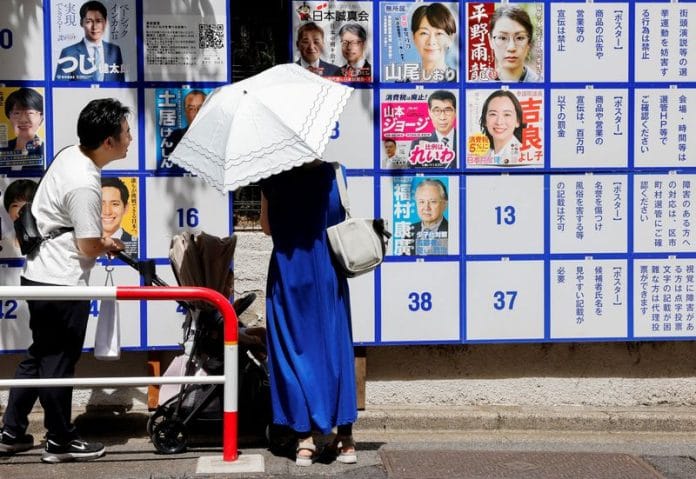By Mariko Katsumura and John Geddie
TOKYO (Reuters) -Japan’s ruling coalition is likely to lose its majority in the upper house, exit polls showed after Sunday’s election, potentially heralding political turmoil as a tariff deadline with the United States looms.
While the ballot does not directly determine whether Prime Minister Shigeru Ishiba’s shaky minority government falls, it heaps pressure on the embattled leader who also lost control of the more powerful lower house in October.
Ishiba’s Liberal Democratic Party (LDP) and coalition partner Komeito needed 50 seats to retain control of the 248-seat upper chamber in an election where half the seats were up for grabs. They are forecast to secure 32 to 51 seats, the exit poll by public broadcaster NHK showed.
Other broadcasters forecast the ruling coalition would hold 41-43 seats. If the coalition holds less than 46 seats, it would mark its worst result since the coalition was formed in 1999.
That comes on top of its worst showing in 15 years in October’s lower house election.
That has left Ishiba vulnerable to no-confidence motions that could topple his administration and trigger a fresh general election.
Opposition parties advocating for tax cuts and increased welfare spending look set to make gains, the exit polls show, with rising consumer prices – particularly a jump in the cost of the staple rice – a key issue for voters.
“The LDP was largely playing defence in this election, being on the wrong side of a key voter issue,” said David Boling, a director at consulting firm Eurasia Group.
“Polls show that most households want a cut to the consumption tax to address inflation, something that the LDP opposes. Opposition parties seized on it and hammered that message home.”
The LDP have been urging for fiscal restraint, with one eye on a very jittery government bond market, as investors worry about Japan’s ability to refinance the world’s largest debt pile.
Adding to the anxiety around the world’s fourth largest economy, Japan faces a deadline of August 1 to strike a trade deal with the United States or face punishing tariffs in its largest export market.
(Reporting by Tim Kelly, Mariko Katsumura and Rikako Maruyama; Writing by John Geddie; Editing by Clarence Fernandez, Edmund Klamann, Toby Chopra and Susan Fenton)
Disclaimer: This report is auto generated from the Reuters news service. ThePrint holds no responsibility for its content.






